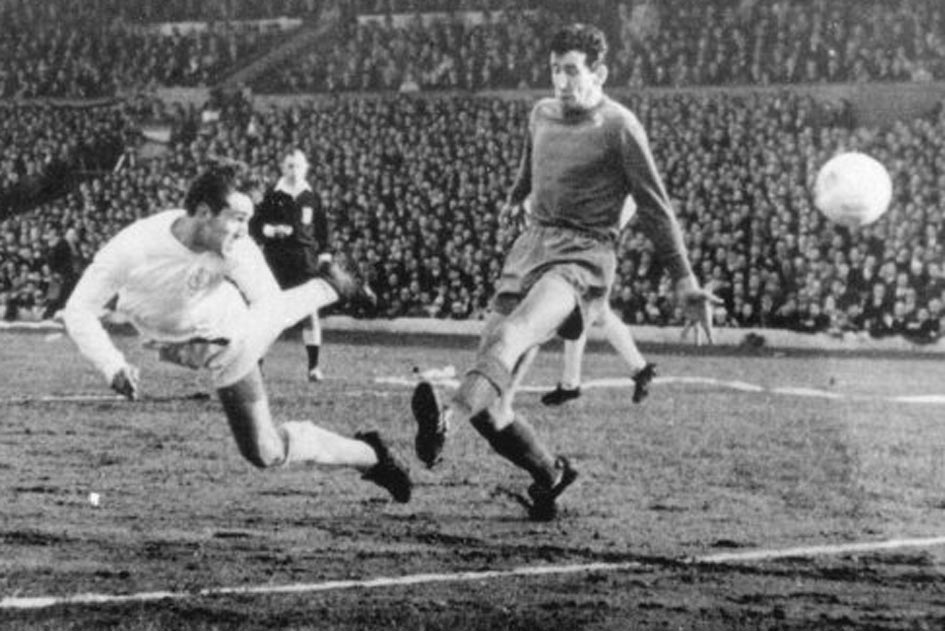

Belfitt: Roderick Michael (Rod)
1963-1971
(Player Details)
Centre Forward
Born: Bournemouth: 30-10-1945
Debut v Huddersfield Town (h) League Cup: 23-09-1964
5’10 1/2” 11st 6 1/2lb (1970)
Born in Bournemouth, he accompanied his parents to South Africa and India as a child,
before they finally settled in the Doncaster area. He attended Hyde Park Secondary Modern
and from there he went to the Doncaster Technical College. He served his apprenticeship as
a draughtsman and, after being on Arsenal's books as an amateur, played for Doncaster United
and Retford Town before Leeds signed him in July 1963. Belfitt was one of the
extra-ordinarily loyal players that Don Revie relied upon to produce a squad effort that
underpinned the brilliance of his top one dozen players, that he relied upon on a more
regular and game by game basis. In his early days at Elland Road, he and Jimmy Greenhoff
emerged as willing substitutes in the absence of Alan Peacock or Jim Storrie and the pair
later provided excellent cover as United battled on several fronts. Belfitt's greatest
triumph came in the 1967 Inter-Cities Fairs Cup Semi-Final First Leg against Kilmarnock when
he netted a hat-trick. With the advent of Mick Jones, Greenhoff moved on to find the fame his
talents deserved. Belfitt remained to play occasionally and to act as substitute on many
occasions. The arrival of Allan Clarke restricted his appearances even more, but he did play
five of the last six games in 1969-70 when United's resources were stretched to the limit by
injuries and a fixture pile-up. The 1970-71 season saw him used extensively from the bench
and in the early part of the 1971-72 season he made ten League appearances when Mick Jones
was out through injury. After serving Leeds for over eight years he then started a nomadic
career which saw him leave United in November 1971 with a move to Ipswich Town for £55,000.
He made his debut at Portman Road against Wolverhampton wanderers on 6th November 1971 and
scored thirteen goals in forty League appearances together with three goals in six Cup
appearances before he made his final League appearance against Everton at Goodison Park on
28th October 1972. The Everton game ended 2-2 with one of the East Anglian scorers being Rod
Belfitt. Harry Catterick, the Everton Manager, was obviously impressed by what he saw because
he signed him, in an exchange deal, as David Johnson went to Portman Road, on Belfitt's
twenty-seventh birthday on 30th October 1972, with Belfitt being valued at £80,000. He made
his debut in a 1-0 defeat at Crystal Palace on 4th November 1972 and then in the next match,
his home debut in a 2-3 defeat by Manchester City, he achieved the remarkable feat of scoring
in successive matches at Goodison for two different teams. It was to be one of only three
goals he would score for the Toffees. Everton were in decline and their forwards were
decidedly poor and Belfitt's confidence in his own ability also declined as did his
popularity with the Everton fans. He struggled in almost every game and was sold to Sunderland
in October 1973 for £70,000. His popularity, or lack of it, with the Everton fans was
understandable as David Johnson went on to score thirty-five times for Ipswich, and then another
fifty-five for bitter rivals Liverpool. He also won three League titles, two European Cups and
a host of other honours. While at Goodison Belfitt scored twice in sixteen starts and seven
games from the bench and scored once in his only F.A. Cup appearance. At Roker he managed
only four League goals in thirty-six starts and two more from the bench. He also started two
F.A. Cup ties, came on as a substitute twice in the League Cup and made one start and had one
game from the bench in the Texaco Cup. After a loan spell with Fulham in November 1974, where
he notched one goal in six League appearances, he left Roker Park for Huddersfield Town in
February 1975. At Leeds Road he scored eight times in thirty-four League starts. He later
played with Worksop Town and Frickley Colliery before teaming up with Mick Bates at Bentley
Victoria. After retiring in 1976 he worked as a draughtsman for ten years, then went to become
a financial advisor for fifteen years until he retired in 2001.